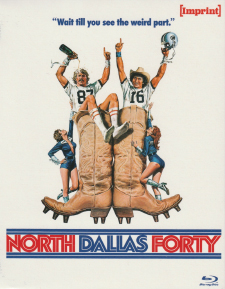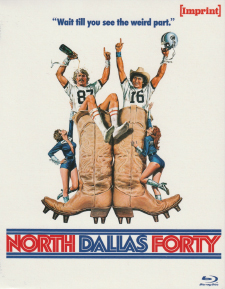North Dallas Forty (Blu-ray Review)

Director
Ted KotcheffRelease Date(s)
1979 (November 4, 2022)Studio(s)
Paramount Pictures (Imprint/Via Vision)- Film/Program Grade: B+
- Video Grade: B+
- Audio Grade: B+
- Extras Grade: B
Review
[Editor's Note: This is a Region Free Blu-ray release.]
Forty-three years after it was originally released, North Dallas Forty remains one of the crown jewels not just in the pantheon of football movies, but in the entire sports genre as well. While many of the elements in it may seem a bit dated these days, the film still remains as relevant as ever in this era of increased awareness regarding the toll taken on the bodies of players due to repetitive injuries such as CTE (chronic traumatic encephalopathy). It also perfectly captures the disconnect between players and the owners who exploit them. As Phil Elliott (Nick Nolte) tells his coach (G.D. Spradlin):
“We’re not the team. They’re the team! These guys right here, they’re the team! We’re the equipment. We’re the jock straps, and the helmets, and they just depreciate us and take us off the goddamned tax returns!”
North Dallas Forty began life as a novel by former Dallas Cowboy player Peter Gent, based loosely on his own experiences with the team. Gent’s frequently harsh source material was inevitably softened a bit on its journey to the big screen, but his themes still shone through in the end. The project was shepherded by producer Irwin Yablans, who also contributed to the screenplay, along with director Ted Kotcheff and Gent, as well as an uncredited Nancy Dowd (Slapshot). Needless to say, the film was produced without the participation of the NFL, so all of the names and logos were changed, but it’s always clear what’s really being represented—the North Dallas Bulls are clear stand-ins for the Cowboys, quarterback Seth Maxwell (Mac Davis) is a barely-disguised representation of “Dandy” Don Meredith, and coach Strother (Spradlin) is a pretty obvious Tom Landry figure. On the other hand, the clash between the players who sell their bodies to the sport, and the owners who prioritize profits over player safety, is truly universal.
Nolte gives one of his very best performances as Elliott, and considering just how many great performances that he’s given over his lengthy career, that’s really saying something. Kotcheff and Yablans surrounded him with a superb supporting cast, including Davis, Spradlin, Dayle Haddon, Charles Durning, Bo Svenson, Steve Forrest, Dabney Coleman, and the late great former player John Matuszak. Under Kotcheff’s sure hand, they’re all quite good—even Mac Davis gives Maxwell a surprising amount of depth. Kotcheff has never really gotten the respect that he deserves, given the extraordinarily varied body of work that he’s provided over the decades, but he really nailed the tone for this film like few other directors could have done. It’s broadly satirical, yet it never feels implausible or forced. There’s an elegiacal quality to it as well, since it successfully conveys that Elliott really does love the sport, despite the exploitative nature of ownership and coaching. The tension between those two elements is the heart of the film, and arguably the heart of the sport itself. That’s best summed up by something that Maxwell tells Elliott midway through the film:
“Hell, we’re all whores. Might as well be the best.”
Cinematographer Paul Lohmann shot North Dallas Forty on 35 mm film using Panavision Panaflex cameras with anamorphic lenses, framed at 2.39:1 for its theatrical release. This version reportedly utilizes a 4K scan from the original camera negative provided by Paramount, and like some of their recent masters, the results can be a bit confounding. There are some weaknesses that are inherent to the original production, like the optically printed opening titles being a little softer and less detailed than the rest of the film. The Panavision lenses that Lohmann used display an extreme amount of softness around the perimeter of many shots, with some of them essentially having only an oval in the center that retains sharp focus. Lohmann also used occasional diffusion filters, which can add to the apparent softness. None of that is particularly surprising, and it’s not an issue with the transfer itself. The odd thing is that the image has a slightly processed look to it, with grain that doesn’t always look natural. The low bitrate doesn’t appear to help, with some smeared textures as a result. Fortunately, there’s very little damage present, most of it in the form of minor speckling, and the color balance looks fine. The contrast range is strong, perhaps just a bit too much so, with some crushed blacks at times. It’s worth pointing out that while the deficiencies in this transfer do stand out when projected on a large screen, they’re much less noticeable when viewed on a smaller display, so your mileage may vary. It still looks good overall, but it does fall short of greatness.
Audio is offered in English 5.1 DTS-HD Master Audio and English 2.0 LPCM, with optional English SDH subtitles. North Dallas Forty appears to have been released theatrically in mono only, but even the 2.0 here is in stereo, so both of these are remixes of some sort. There’s not much difference between the two, as the dialogue and effects are still mono, with the stereo spread coming solely from John Scott’s score. The 5.1 does add some reverb from the music into the surrounds, but nothing else. Engaging a decoder on the 2.0 creates phantom surrounds that sound pretty similar, so once again, it’s not a drastic difference. The stereo spread of the score does seem a bit stronger in the 2.0, since the 5.1 steers some of it into the center channel, but you really can’t go wrong either way.
Via Vision’s Region-Free Blu-ray release of North Dallas Forty is #173 in their Imprint line, and it comes with a Limited Edition slipcase featuring artwork based upon one of the theatrical posters. The following extras are included:
- Audio Commentary by Daniel Kremer and Daniel Waters, with Ted Kotcheff
- Introduction by Ted Kotcheff (Upscaled HD – 1:21)
- Hit Me with Those Best Shots: Ted Kotcheff Remembers North Dallas Forty (HD and Upscaled HD – 5:22)
- Looking to Get Out: A Comparative Analysis of the Ted Kotcheff Vision (HD – 18:36)
- Theatrical Trailer (HD – 3:04)
Filmmaker/historian Daniel Kremer and screenwriter Daniel Waters offer a relaxed and conversational commentary for North Dallas Forty, interspersed with a few interview segments from Kotcheff. Kremer admits up front that despite his love of both the film and Kotcheff, he’s not really a football fan, so Waters is a perfect companion for this track—Waters describes himself as a “screenwriter and football fan.” He also describes the film as “The Godfather of football movies.” They spend some time examining the production and provide some interesting information, like the fact that Matuszak served as a sort of an unofficial assistant director on the set, advising Kotcheff on the details of the football life. Kremer and Waters make good companions for a track like this, with Kremer providing the specifics, while Waters focuses on his personal connection to the genre—in fact, he wonders at the end if he sounded too much like Chris Farley. (He’s got nothing to worry about on that score).
Both the Introduction and Hit Me with Those Best Shots feature Kotcheff reminiscing about North Dallas Forty, which he describes as a great experience with a wonderful cast and crew. He talks about the opening and closing shots in the film, and explains how those two bookends are always the most important part of every film. He stresses the need for technical accuracy in a story like this, and praises Matuszak for the invaluable help that he provided in that regard. Looking to Get Out is a video essay by Kremer that examines the way that Kotcheff used his deceptively simple visual style to express the primary themes in his movies. Kotcheff may have made films that seemed wildly divergent, but Kremer sees a unifying pattern that links all of them.
North Dallas Forty may or may not be The Godfather of football movies, but it’s unquestionably one of the most important sports films ever made, and it holds up well even when considered from a modern sporting perspective. While Paramount’s new 4K transfer might fall a bit short of perfection, Via Vision has provided a nice collection of extras to support their release, so this is currently the best Blu-ray edition available for this football classic.
- Stephen Bjork
(You can follow Stephen on social media at these links: Twitter and Facebook.)

